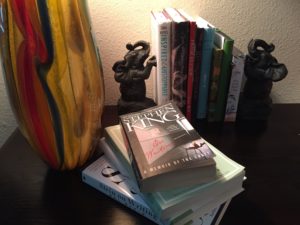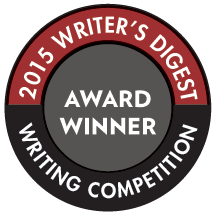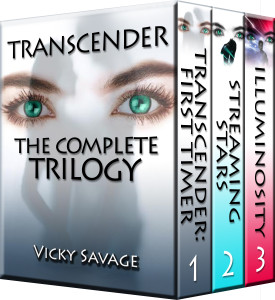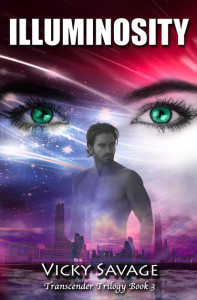Books
Time for true confessions: When I first got into the business of writing novels, I was as naïve as they come. I’d practiced law for a number of years, worked hard to reach the upper echelons of corporate management, and then, feeling tired and burned out, took some blessed time off to be at home with my two kids. At one point, when my youngest was in middle school, I got it into my head that I could write the next Harry Potter or Twilight series. So, with no training whatsoever, I set out to do just that. It took me four years to complete my YA sci-fi series, the Transcender Trilogy—a year longer than it took me to complete law school, and every bit as much of an education. So far, I’m sorry to say, it hasn’t broken any sales records! 🙂 But I never had so much fun!
Recently, I received a Certificate in Editing from Poynter University and ACES (American Copy Editors Society). This article is my first on the editing process. I hope that by sharing some of my own initial faux pas, I can spare others from making similar mistakes.
Five Costly Mistakes I Made:
- Having my manuscript edited too early in the process. From the moment I put the last period on the last sentence of my first complete manuscript, I began searching for an editor. The writing process had been long and arduous, and I was so thrilled to be finished at long last, that I didn’t realize my draft still needed A LOT of work. Big Mistake. The document I received back from my first editor was crammed with so many comments, corrections, and suggestions for revision that I was forced to hire a second editor just to edit my rewrites, and a third to proofread and copyedit the final draft (because, as I learned the hard way—rewrites introduce brand new errors).
My Advice: Save yourself a ton of time, money, and heartache—once your manuscript is complete, celebrate by taking some time off to savor your tremendous accomplishment. Put the manuscript away for at least a week (longer if possible) and then go back to it with fresh eyes and a red pen. I assure you, you’ll find a ton of things that need correcting or revising prior to sending it off to an editor.
- Not having a clear agreement with my editor as to what and how her services were to be provided. I still shake my head in amazement when I think of how careless I was about pinning down details with the editors I hired. With my background, I should’ve known better, but at the time, I didn’t understand about the many levels of editing—which range from ghostwriting to simple proofreading and grammar fixes—and the different sets of duties that go along with each level. Even more eye-opening for me was the fact that not every editor provides comments and corrections in the same fashion. I swear this anecdote is true: one supposedly experienced editor I hired actually retyped my entire manuscript making her changes as she went along, and providing me with no way to determine what those changes were. I was devastated by her arrogance and forced to trash all of her work, since she had essentially made my book her own. I also had to eat the not inconsiderable sum I’d already paid for her services and find another editor.
My Advice: Reputable editors will clearly spell out their services before undertaking a project. You may ask for different or additional services, but expect to pay more if you add services. You probably don’t need a seven-page, signed contract with your editor, but you should get the final agreed-upon list of services in writing. Also, ALL reputable editors will clearly mark their changes on your original document. Some still do this by hand on a hard copy of the manuscript, but most now use the “track changes” function in a word processing program, which allows you to “accept” or “reject” the change with a simple keystroke. If it’s not expressly stated, ask your editor how comments and corrections will be handled.
- Hiring an editor because she was cheap and discovering she knew less about editing than I did. These days, whether you’re attempting to find and agent or going the self-publishing route, your book needs to be polished and up to professional standards. I’ve had the good fortune of working with a couple of amazing editors over the years, but my experience has been that good editors don’t come cheap. This is an area where you cannot afford to scrimp, though. Publishers and literary agents have little tolerance for sample pages with misspellings and format errors, and readers will absolutely crucify you on Amazon if you self-publish a book that is poorly edited.
My Advice: Interview a few editors—in person or via Skype or email—before you hire someone. No specific degree or certificate is required for someone to say they are an editor, so make certain the one you hire has the credentials and experience you’re looking for. It helps if that person has previously edited or written in your genre, or at least has a good working knowledge of the area. Also, find someone whose personality and work ethic mesh with yours. The editor-writer relationship requires clear communication, evenhanded negotiation, and mutual respect.
- Taking editorial comments personally and not as suggestions to improve my manuscript. Many editing courses strongly emphasize the delicate task editors undertake in proposing improvements to a writer’s work without offending him or her. Nobody needed to explain that to me—I already learned it first hand. Over the course of having my three books and several short stories edited, I’d experienced anger, frustration, and even tears over certain editorial comments regarding my precious work. Didn’t my editor understand these were my babies she wanted to do away with? Every writer hopes his or her editor will say, “Wow! This manuscript is perfect just the way it is!” But believe me, no matter how well you write, that’s never going to happen. You’re going to have to sacrifice some of your “little darlings” along the way.
My Advice: Remember, editorial comments are only suggestions—one person’s opinion–which you are entitled to ignore if you wish. BUT, editors are also readers, and if one reader has a problem with your novel’s pacing, or a certain passage, plot-point, or character, it’s in your best interest to seriously consider whether other readers might have the same reaction. Regarding revisions, Mary Barnhill said, “…every cut hurts, but something new always grows.” So grow some thicker skin—you’re going to need it when those Amazon reviews start pouring in!
- Being in a rush to query agents/publish my book. I know, I know, you’ve spent months, maybe even years writing your manuscript, now you want to share it with the world and begin reaping the benefits for all your hard labor. After all, your mother said it’s the best book she’s ever read, right? Stop for a minute, and remember Hemingway’s observation: “The only kind of writing is rewriting.” Edits always require some amount of rewriting. At times, large portions of your manuscript will need to be reworked. In the past, I was impatient and sometimes rushed my rewrites—particularly with my last book, when I was receiving almost daily pressure from readers anxious for the final installment of the trilogy. In hindsight, I probably should have relaxed and allowed myself more time for rewrites.
My Advice: Don’t short-change yourself and your project—take all the time you need to thoroughly address any editorial comments. Discuss them with your editor, and think them through rather than just slapping a Band-Aid on the problem. My trilogy has been well received, and the experience as a whole was invaluable, but I sometimes wish I could go back and rewrite those books, using what I’ve since learned about writing and editing. Some will tell you, “Done is better than perfect.” But your writing will forever stand as a reflection on you. If you take the time to polish your work to the point where you can say, “This is as tight and perfect as I can make it,” you can always be proud of the final product.
Good Luck to you in all your writing endeavors!
Not wrestling the guy–just his advice! Continuing my series on my favorite quotes and epigraph, I want to share two quotes (and the epigraph) from Stephen King’s book On Writing: A Memoir of the Craft – one quote I love and agree with completely the other quote is, in my humble opinion, 100% wrong, and terrible advice for writers!
Before I get to the quotations, a word about the book On Writing: I highly recommend it to anyone who is a writer or considering becoming a writer. Although I found the memoir part to be a bit slow and boring, I dare say King’s fans will find it fascinating. More importantly the advice bits in the book (with the exception noted below) are incredibly valuable and worth the slog through the rest. Pay special attention to the appendices at the back of the book: “And Furthermore Part I,” which contains an actual example of King’s editing process (worth studying); “And Furthermore Part II,” which contains a lovely book list.
My favorite King quote: “If you want to be a writer, you must do two things above all others: read a lot and write a lot.”
In my own work I’ve found this to be absolutely true! Reading, reading, reading, good books, bad books, poetry, literary journals, movie reviews, even a well written cereal box contributes to your knowledge and skills. For me there’s nothing more inspiring than a piece of brilliant writing. It forces me to strive for excellence in my own work. Even crappy writing has its place—to instruct us what not to do. Some complain it’s difficult finding the time to read, and admittedly, I don’t always have time to read a novel, but so much wonderful short writing exists out there today, there’s really no excuse. Check out Kindle Singles! As far as writing goes, I’ve found these skills must be exercised, or like flabby thighs, they begin to lose tone and appeal.
My least favorite King quote: “Any word you have to hunt for in a thesaurus is the wrong word. There are no exceptions to this rule.”
WRONG! Please, if you’re a new writer or considering becoming a writer, do not follow this advice. In your work, it’s of the utmost importance to use precisely the best word to convey the action, thought, or feeling you’re trying to get across to the reader. Well, guess what? That precise word does not always pop right into your mind! (Unless you’re SK, apparently) You may be able to visualize it, feel it, hear it, even smell it, but at times the proper word may frustratingly elude you. At these moments, the thesaurus is your best friend. I use it dozens of times a day—sometimes just to check to be certain there’s not a better word than the one I’ve already chosen. I believe that makes me a better writer. Sorry, Mr. King, but I take exception to your rule!
As a little bonus, I leave you with the epigraph to King’s On Writing. It always makes me smile:
Honesty’s the best policy.~ Miguel de Cervantes
Liars prosper.~ Anonymous
Apologies to anyone who thought this post was about wrestling! 🙂
Okay, okay, I know it’s not even Halloween yet, but I’m feeling in the Christmas mood. The holiday season always inspires me to be hopeful and energized. That feeling of excitement arrived a bit early for me this year! 
This logo in the left corner is an award I was honored to receive in Writer’s Digest’s annual writing competition for my short story “Nowhere, Man.” One of the reasons I’ve neglected my blog for so many months is that I’ve been focused like a maniac on improving the quality of my writing by creating shorter works of fiction (and a bit of non-fiction and poetry). This award was like receiving an early Christmas present. It’s gratifying to have my work recognized, and I sincerely hope to see more of these darlings in the future!
Delving into the world of literary short fiction has been an eye opening, educational, and sometimes frustrating experience. On the positive side, the satisfaction derived from completing a project comes much more often than with novel writing. A novel can take me up to a year or more to complete. On the negative side, the rejections also arrive much more often. One of my workshop instructors noted that the odds of having a short story published in a literary magazine are lower than the odds of getting into Harvard. As daunting as that statistic sounds, the worst part for me is actually having to develop new project ideas at a dizzying pace. Finish one story and bam! gotta start another one. All my old characters and the worlds I created must be abandoned for new ones, and just when I was getting to know them. But the next tale is always waiting to be spun.
I learned something valuable about myself during this process: While I enjoy writing short stories, and will always have one or two in the works, my temperament is better suited to long term projects (novels and series). I like getting up each morning and knowing exactly what I’m going to write that day. It may not always come out precisely as I intended when I sat down, but at least I know what the chapter is supposed to be about. And I like making friends with my characters and having them in my life for more than a few weeks at a time.
Consequently, I’m working on getting back to my roots and developing ideas for a new series (Yay!). I’m also compiling a collection of some of my short stories, which I hope to publish around the first of the year, while continuing to submit my already completed stories to contests and publications.
I regret I’ve been so absorbed in other projects that I haven’t updated my blog more frequently and haven’t posted many (read: any) book reviews lately, but I intend to be more diligent about that. Two non-fiction books I’ve read recently and highly recommend are:
Big Magic: Creative Living Beyond Fear, by Elizabeth Gilbert. Can’t say enough about this wonderful book and its healthy approach to living the creative life. It’ll make you feel good about yourself and whatever creative outlet you choose to pursue. I listened to the audio book narrated by the author and found it absorbing and entertaining throughout.
How to Write Short, Word Craft for Fast Times, by Roy Peter Clark. Roy Clark is a real smart guy when it comes to the art of writing, and I love all of his books, but this one is my favorite. Not just for writers, it has practical advice for everyone on how to write shorter and crisper, whether posting a tweet, or undertaking the great American novel.
Hope to share more soon. In the meantime, have a Happy Halloween!

*On my birthday my amazing daughter gave me Joni Mitchell The Complete Poems and Lyrics. I’d sleep with this awesome book under my pillow if I thought some of Joni’s creativity could transfer to me by osmosis! You may recognize the title of this post from one of her songs.
I’ve taken a bit of a hiatus from social media lately and it’s been refreshing, but its time to get back on that horse, and my first order of business is this blog post (apologies to my Facebook and Twitter friends). I have been busy personally during this little respite—traveling, getting through the holidays, and moving into a new house. I have also been busy professionally writing short fiction. It’s true! Those of you who have read my somewhat long-winded trilogy may not believe it possible, but lately I’ve been turning out finished products that are between 3000 and 5000 words. Why? Well, I was inspired to try my hand at short fiction for several reasons—the major ones being to explore new ideas and try out new genres. Also, I read this wonderful article by Anne R. Allen http://www.writersdigest.com/online-editor/9-ways-writing-short-stories-can-pay-off-for-writers, which suggests, “short stories are having a revival in the digital age.” One need only look at the success of Kindle Singles for confirmation of this statement. http://www.theguardian.com/books/booksblog/2013/sep/05/amazon-kindle-singles-short
If that isn’t reason enough to write short fiction, here are some other considerations that influenced me, and five reasons why you may want think about taking it up yourself.
- You Probably Already Have Short Story Material Lying Around.
This summer I took some writing workshops for fun and my own edification. I had in mind to use my assignments to explore ideas for my next novel, but by the end of the summer I still had not decided which plot I was most attracted to—I loved them all. Then I realized that I already had material enough for at least three short stories using what I had written in my workshops. If you’re like me and many other writers, you probably have numerous half-written novels or stories growing mold in a desk drawer or on a flash drive. Why not dig out these hidden gems, dust them off, and revise them as short fiction? Don’t let all that hard work go to waste. Use your skills to transform your discarded material into something salable. Don’t get me wrong, writing short stories is an art, and you need a slightly different skill set to master the craft, but there is help out there. I found these two books to be enormously informative: Short Story: From First Draft to Final Product, by Michael Milton http://www.amazon.com/SHORT-STORY-FIRST-Draft-Product-ebook/dp/B00FDUMTRE; and Let’s Write a Short Story, by Joe Bunting http://www.amazon.com/Lets-Write-Short-Story-Bunting-ebook/dp/B008Z96GF6
- Writing Short Fiction Helps Hone Your Writing Skills.
One of the best and most experienced editors I ever met told me that the key to good writing is clarity. I’ve never forgotten this and have lately striven to make my writing more crisp and concise. Writing short fiction forces you to do this. You take a big story and whittle it down to the minimum amount of words possible to get the reader on board, sweep them along for the ride, and deposit them at the end of the express lane feeling deeply satisfied. It’s not always easy, but it forces you to dump every superfluous adjective and adverb and use the precise word necessary to covey the exact idea or emotion you’re trying to get across. I took one of my stories that began at 5700 words and cut it down to 5000 words to enter it into a short story contest. Then I found another contest that seemed even more perfect for my story, the problem was, I had to cut it nearly in half—to 3000 words. It was painful! But, I was shocked to find that I actually liked the 3000-word story much better. It was an enlightening exercise.
- You See the Results of Your Labor Much Sooner.
It took me about a year to write each of my three novels—that’s a big chunk of time. Looking at the busy year ahead of me, I decided I wanted to take on some shorter projects that would allow me to do more in the same amount of time. Writing short fiction has not only given me a sense of accomplishing more in less time, but it has also opened up a new area of interest for me, which I can turn to whenever I’m stuck in my writing or looking for a pleasant distraction. I’ve even done a little genre-hopping with my stories. Writing short fiction has also boosted my writing confidence and given me a better understanding of story structure (which is the same regardless of length).
- Writing Short Fiction Gives You Credibility.
Okay, I won’t lie—it’s difficult to have a short story accepted for publication and the review process takes a long time, months in fact. But agents and publishers will tell you that winning a short story contest or having a story appear in a reputable publication, beefs up your resume’ (or query) considerably. We’re all looking for credibility and recognition even if we don’t aspire to be traditionally published.
- Writing Short Fiction Pays.
Many literary publications pay thousands of dollars for the short stories they publish (and the copyright almost always reverts to the author). Also, dozens of contests are held each year offering hefty cash prizes for the winners in addition to publication. Then, too your story may be picked up for inclusion in an anthology—another great way to earn money. But hey, if you have a story that is polished and you feel will appeal to the masses (or even just your fan base) you can publish it yourself. Kindle Singles sell for prices ranging between $0.99 and $4.99—or about the same as a full-length book.
If any of this has inspired you to delve further into the opportunities out there for short fiction, you’ll find many helpful articles and books out there to guide you along. Good luck with your writing, and keep an eye out for some of my stories coming soon on Kindle (and elsewhere, I hope!).
Christmastime always makes me nostalgic. My most memorable Christmases are those I spent as a kid. The holiday season has always seemed magical to me and it was even more so when I was a child. There were many years when I received a memorable gift that had a lasting impact on my life – my first Barbie doll, my first record player (complete with Beatles records), my first transistor radio (with ear phones so my parents didn’t know I was listening all night), and the list goes on.
As an adult, it takes a little more than a Barbie doll to rock my world, but I’m excited to report that I’m finally getting a new car this year. It was difficult to think about parting with my reliable old Mercedes, but when someone pointed out to me that I have readers younger than my car, I decided it was time! Also, our family is gathering in our new home this year, and we all seem to be embarking on exciting new phases and of life, for which I am thankful.
Anyway, the holiday season is such a hopeful time of positive new beginnings, and even though I’m not a child anymore, I feel like one at this time of year. This quote from Agatha Christie seems to sum it all up, “Suddenly you find … that a whole new life has opened before you … as if a fresh sap of ideas and thoughts was rising in you.” I wish that feeling for you this holiday season and throughout the coming New Year!
As a small Christmas gift to my readers, I’ve placed the Transcender Trilogy Complete Box Set on sale from December 23 through December 26. Only $1.99 for all three Kindle books. Makes a nice gift. Tell all your friends!
I know it seems odd to be writing about death during the holiday season when joy and good cheer are the order of the day, but I’ve been thinking a lot about death lately for a couple of reasons. First, I began writing a new novel in the fall with a wisecracking, smartass narrator who just happens to be—you guessed it—dead! After a night of hard partying, my protagonist died from an accidental overdose, and while heaven is everything it’s always been touted to be, it’s really not his cup of tea, so he’s trying to earn his way to another life on earth.
“If death meant just leaving the stage long enough to change costume and come back as a new character…Would you slow down? Or speed up?” ~ Chuck Palahniuk, Invisible Monsters
The second reason death has been on my mind is that a longtime friend of mine just passed away only weeks after being diagnosed with late-stage pancreatic cancer. Her death has deeply shaken me not only because it came so quickly and unexpectedly, but also because she was so full of life and had so much to live for. She is survived by a loving family—including two daughters who are left asking why?
“To the well-organized mind, death is but the next great adventure.” ~ J.K. Rowling, Harry Potter and the Sorcerer’s Stone
I was forced to confront my ideas regarding death back when I was in my twenties. My husband of seven years died tragically in a freak accident only months after our daughter was born. Within days of his death, my boss and mentor suffered a major heart attack and also passed away—leaving me widowed and unemployed within the span of a week. I had an infant to care for, a large mortgage to pay, and an IRS audit to get through, but my greatest concern was Where are my husband and my mentor? Are they safe and happy?
I read everything I could get my hands on about death and dying, near death experiences, and people who have stumbled upon life between lives while undergoing past life regression. I gained a lot of comfort from the fact that the accounts are remarkably similar and remarkably positive. Collectively, it seemed to be an affirmation that the spirit does go on. There isn’t room to go into it all here, but the most poignant and inspirational account I’ve read is in Anita Moorjani’s amazing book Dying to Be Me: My Journey from Cancer to Near Death to True Healing. I recommend this book to everyone, even if you’re not searching for answers about life after death. It’s a stunning account of Ms. Moorjani’s experience on “the other side,” and it also serves as a guide to living an authentic life. The bottom line is this: we’re all spiritual beings whose essence is pure love, and the only thing we’re here to do is be our true selves. If we can accomplish that we’ve lived a worthwhile life.
“Love is how you stay alive, even after you are gone.” ~ Mitch Albom
My friend Nancy was a remarkably authentic individual—smart and sassy, but always concerned about making others feel loved and accepted. She will be fondly remembered and greatly missed by the many who loved her.
Hope I haven’t been too much of a Debbie Downer today. I’ll close with my favorite funny quote about death:
“I’m not afraid of death; I just don’t want to be there when it happens.” ~ Woody Allen
Happy Holidays, everyone! Watch for the upcoming kindle sale of the Transcender Trilogy Complete Box Set during Christmas week. Details will be announced here and elsewhere.
Thanks to everyone who entered the Goodreads giveaway of ten signed copies of ILLUMINOSITY, and congratulations to all those who won! You’ll be receiving your books soon.
If you missed out this time, never fear, on Monday, July 21, I am beginning a week-long, whirlwind Blog Tour and Giveaway—two posts a day with some amazing bloggers! The grand prize is a $50 Amazon gift card and a set of signed Transcender Trilogy books. Second and third place prizes will be awarded also, with a chance to win a Transcender T-shirt.
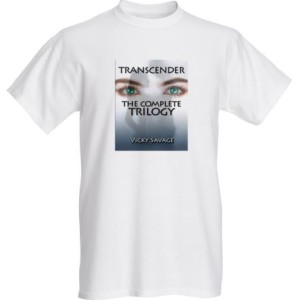 I hope you’ll follow along and join in the fun! Take the Transcender Character Quiz to see which character you are most like, and don’t miss my Dream Cast for the Transcender Movie. Should be a great time with plenty of opportunities to win!
I hope you’ll follow along and join in the fun! Take the Transcender Character Quiz to see which character you are most like, and don’t miss my Dream Cast for the Transcender Movie. Should be a great time with plenty of opportunities to win!
Transcender Blog Tour Schedule:
July 21 Ensconced in Lit – review and Crystal in Bookland – guest post
July 22 Pandora’s Books – guest post and Ensconced in Lit – character interview
July 23 YA Book Nerd Reviews -review and Wonderland of Reading – review
July 24 The Whimsical Mama – guest post and Fly to Fiction – Review
July 25 Tea and Fangirling – Review and A Reading Nurse – guest post
July 26 I Heart YA Fiction – Author Interview and Mary Had a Little Book Blog – guest post
Also, please sign up for my Newsletter, if you haven’t already. I only send them out occasionally when there is something special to announce!
Thanks for stopping by, and good luck in the Giveaway!
So thrilled to unveil the cover for my latest book, ILLUMINOSITY, the exciting third and final installment in the Transcender Trilogy. Once again the talented Carrie Drazek has outdone herself with this gorgeous design.
Enter the Giveaway for $50Amazon Gift Card and signed copies of the first two book in the trilogy at ENSCONCED IN LIT http://goo.gl/SdJxfq
Announcing the Upcoming Release of
ILLUMINOSITY
by Vicky Savage
May 15, 2014
Mystery, romance, and high adventure in parallel dimensions.
In this highly anticipated conclusion to the Transcender Trilogy, Jaden Beckett faces her greatest challenges to date. Her choice is clear: leave the love of her life or face certain death.
With Warrington Palace under siege, Jaden and Ryder are wrenched away from each other, as the powerful Inter-Universal Guidance Agency seeks Jaden’s ultimate demise.
Heartsick and alone, she begins a new chapter of life as a Transcender, only to discover that her fiercest battle has yet to come.
Is Jaden safe anywhere in the galaxy? Or should IUGA ask itself that question, having underestimated her before?
With her usual wit and tenacity, Jaden fights to discover her place in the multiverse, the true meaning of destiny, and the keys to the mystery of eternal love.
Re-Blogged from my Orangeberry Book Tour
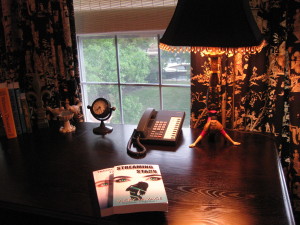 I’d like to share some pointers I’ve picked up since embarking on my journey as a writer:
I’d like to share some pointers I’ve picked up since embarking on my journey as a writer:
1. BEING AN AUTHOR IS AS MUCH ABOUT MARKETING AS IT IS ABOUT WRITING.
“That can’t be!” you cry. But alas, it’s true. Writing the book is the easy part. Whether you’re and indie or traditionally published author, expect to spend a large chunk of time marketing your books. You’ll find many aspects of it can be fun. Accept it as part of the process and enjoy!
2. YOU NEED AN AUTHOR PLATFORM.
An “Author Platform” is simply your internet presence, your visible “brand.” It’s what readers will find if they Google you, and it’s an efficient way to develop a loyal fan base. Generally, a platform consists at a minimum of a website, Facebook Fan Page, Twitter account, blog, and, optionally, accounts on LinkedIn, Pintrest, Google+, and/or Instagram. Don’t panic. It’s not as daunting as it sounds and it can be built over time.
3. YOU MUST SHOW UP FOR WORK.
The good news: being a writer is great fun and there’s no dress code! The bad news: you actually have to do the work. Make a schedule and try to write at the same time and for several hours each day. Don’t answer the phone, check your email, or raid the refrigerator. You’ll be amazed at how much you get done.
4. YOU WILL VISIT THE PIT OF DESPAIR.
It’s unavoidable. Every writer experiences bouts of self-doubt every now and again and for no apparent reason. It’s an occupational hazard like black lung disease (only worse). The best way to handle it is to recognize it’s temporary. Focus on your accomplishments, read a piece of amazing writing, polish the chapters you’ve already written, call a friend who can be trusted to talk you off the ledge. Just relax until it passes.
5. READING IS AS IMPORTANT AS WRITING.
“If you don’t have time to read, you don’t have the time (or the tools) to write.” – Stephen King. I find reading invaluable for three reasons: it keeps me current in my genre; it keeps my writing sharp; and it’s a relaxing break from writing. Actually, I feel like I’m still working whenever I’m reading a good book, because I’m observing another author’s style, plot development, character growth, etc.
6. NO MATTER HOW GREAT YOUR WRITING, EXPECT TO GET DISSED.
They say you’re not a real writer until your first bad review. Regardless, it stings like hell. Learning to shrug off a bad review is essential to surviving in this industry. Maybe the reviewer just didn’t understand your book, or didn’t really read it. Sometimes, though, the reviewer has a valid point, in which case we need to take our medicine, no matter how foul tasting, and try to benefit from it. My recommendation: grow some Rhino skin.
7. IT’S OKAY TO SHOVEL CRAP AS LONG AS YOU CLEAN IT UP LATER.
The best advice I ever received as a writer is: “Do whatever it takes to get that first draft completed.” Don’t worry about how inane or ugly it is. You can fix it later. It goes against our perfectionist tendencies, but it really works.
8. WRITING IS A LIFE-LONG HONING OF THE CRAFT.
I’m constantly amazed at how much I learn every day just by reading other writers’ blogs, participating in author forums, or listening to readers. Remember, even after you fearlessly claim the title “Writer,” there’s always room for improvement.
9. AN EXTENSIVE VOCABULARY IS MORE IMPORTANT THAN KNOWLEDGE OF GRAMMAR.
Vocabulary and grammar are both important to writing, but rules of grammar are broken more often than they’re observed in novel writing, especially where dialogue is concerned. I do little things every day to expand my vocabulary. Grammar I leave to the editors.
10. EVEN ON ITS WORST DAY, WRITING IS MUCH MORE FUN THAN PRACTICING LAW.
Enough said!
Okay, you’re cooking along on your manuscript. You love what you’ve written so far, the story’s gelling, and it looks like you might even meet your deadline. Then one day you plop down in front of the computer and what the?… it’s just not there anymore. Your mastery of words has evaporated, your ideas have turned to dust, and your brain is completely sucked dry of all creative juju. It’s even looking like the stuff you thought was so brilliant yesterday is actually a pitiful pile of banal blather that needs to be thrown into the trash compactor with wet coffee grounds poured on top. You begin wondering why you didn’t just become an auto mechanic like your aptitude tests all said you should.
Don’t despair, you just have a case of writer’s self-doubt. It happens to us all of us. At one time or another we all face the fear that our writing just isn’t good enough. So, what’s the cure? Some writers suggest that you simply write your way out of it. Well, hello? Writing’s the problem in the first place. Sometimes a different solution is required to remove the grotesque mass of creativity clogging goo from your stream of consciousness and to get your fingers tapping those keys again in that magical, enigmatic rhythm that causes delicious prose to literally pour onto the page like hot caramel.
Soothing Self-Doubt
Researching this subject, I was stunned at the number of articles on writers’ self-doubt. It’s an epidemic! So how do you wrestle the culprit to the ground and kill it? The short answer is: You don’t! That’s giving self-doubt way too much power over you.
The key is to relax and cut yourself some slack. Self-doubt is like the common cold—you can’t cure it, but you can soothe it and shorten it. Eventually it will go away by itself. Trust me.
Here are a few techniques to soothe and inspire you while waiting for your creative juju to return.
- Embrace your self-doubt. Robert Hughes said “The greater the artist, the greater the doubt. Perfect confidence is granted to the less talented as a consolation prize.” All talented writers have experienced self-doubt at one time or another. So, if you want to be considered up there with the greats, self-doubt is something you learn to deal with.
- Focus on your accomplishments, and resist the urge to compare yourself to others. Re-read your good reviews and fan posts. Ignore the people who just don’t get your work. It doesn’t matter how amazing your writing is, someone is going to trash it. It goes with the territory. Keep reminding yourself of how much you’ve already accomplished and how much more you still want to do. Call your mom, she’ll tell you how great you are.
- Find a good book on editing and polish up what you’ve already written. I love the rewriting process, because I always find a sentence or paragraph or scene that can be made better with a little shrewd editing. It builds confidence to improve on what you’ve already got, and it’ll give you something constructive to do until this passes. I recommend Stein on Writing by Sol Stein.
- Re-read a great piece of writing. Dust off your favorite book of all time and be reminded of what inspired you to write in the first place.
- Make a list of your favorite phrases, descriptions, and scenes of all time. Read through your list when you feel stuck. Find one emotion-packed word you can use or a phrase you can tailor to fit your own plot. Plug it into your story and start writing.
- Watch Elizabeth Gilbert’s superb TEDTalk “Your Elusive Creative Genius,” http://www.ted.com/talks/elizabeth_gilbert_on_genius.html. She’ll convince you that the divine attendant spirit who really writes your books is just taking a little break … she’ll be back!
Most of all, be patient!
About

I’m a writer and author of novels, short stories and poetry. My TRANSCENDER TRILOGY blends science-fiction, fantasy, and romance in an exciting cross-dimensional adventure. My latest, The Weight of Air, is a short work of contemporary fiction presenting a tantalizing "Would I?/Wouldn't I?” dilemma.

